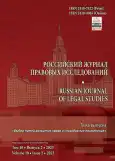Overview of Digital Technologies for Anti-corruption Purposes
- 作者: Stepanov O.A.1, Basangov D.A.1
-
隶属关系:
- Institute of Legislation and Comparative Law under the Government of the Russian Federation
- 期: 卷 10, 编号 2 (2023)
- 页面: 49-54
- 栏目: Public law
- ##submission.dateSubmitted##: 16.05.2023
- ##submission.dateAccepted##: 08.06.2023
- ##submission.datePublished##: 18.07.2023
- URL: https://journals.eco-vector.com/2410-7522/article/view/430140
- DOI: https://doi.org/10.17816/RJLS430140
- ID: 430140
如何引用文章
详细
The article was prepared within the framework of analysis of the results of the events dedicated to the 100th anniversary of the Institute of Legislation and Comparative Law under the Government of the Russian Federation. The article gives an overview of the possibilities of using digital technologies to counteract corruption. It is noted that a prerequisite for the successful realization of the benefits of digitalization of public practice is the availability of technological infrastructure, as well as improvement of the legal response associated with the implementation of technological policy. Anti-corruption practices related to Big Data processing (Big Data), distributed registers technology (blockchain), data mining technology (neural networks, artificial intelligence), crowdsourcing technology, and information technology that identifies corruption risks in the financial sector (Forensic Tools) are discussed in more detail. However, the realization of the potential of digitalization in this area implies the need to improve the legal response concerning the implementation of technological policies aimed at suppressing corruptive factors. In this regard, the role of individual judicial regulation as one of the ways to overcome legal gaps and conflicts increases.
全文:
作者简介
Oleg Stepanov
Institute of Legislation and Comparative Law under the Government of the Russian Federation
编辑信件的主要联系方式.
Email: soa-45@mail.ru
ORCID iD: 0000-0003-1103-580X
SPIN 代码: 8156-9725
Scopus 作者 ID: 57208665632
doctor of law, professor, chief researcher
俄罗斯联邦, MoscowDenis Basangov
Institute of Legislation and Comparative Law under the Government of the Russian Federation
Email: d_basang@mail.ru
ORCID iD: 0000-0002-2776-4241
SPIN 代码: 3456-3920
candidate of legal sciences, senior researcher
俄罗斯联邦, Moscow参考
- Xiao W. Freedom of information reform in China: Information flow analysis. International Review of Administrative Sciences. 2013;79(4):790–808. doi: 10.1177/0020852313500598
- Aryamov AA, Ruyeva EO. Corruption combating in conditions of digitization: national experience. Rossiiskii sledovatel'. 2021;(8): 57–60. (In Russ.). doi: 10.18572/1812-3783-2021-8-57-60
- Khayrutdinova LR. Anticorruption crowdsourcing as social feedback mechanism on a “society-state-society” in the fight against corruption. Modern Scientific Research and Innovations. 2016;(8):347–352. (In Russ.).
- Truntsevsky YV. E-anti-corruption or e-corruption: the influence of global digitization. International Public and Private Law. 2019;(4):42–48. (In Russ.).
- Ivanova JuA, Sarbaev GM. K voprosu o kiberprestupnosti. In: Tsifrovye transformatsii ehkonomiki i prava: collection of scientific abstracts of the National Scientific and Practical Conference. Moscow, 2021 Dec 8. Volgograd; 2022. P. 58–64. (In Russ.).
- Gumerov LA, Suleimanova ASh. Individual Judicial Regulation of Legal Relations in the Scientific and Technological Sphere. Russian Justice. 2023;(4):48–54. (In Russ.).
- Stepin AB. Types of individual judicial regulation. Russian Journal of Legal Research. 2018;5(1):193–197. (In Russ.).
补充文件






